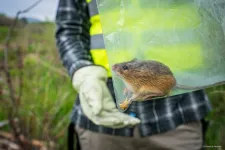(Press-News.org) Key takeaways
Rising temperatures will cut the number of days when conditions favor prescribed fires by 17% on average across the Western U.S., mostly in spring and summer.
Winter, however, will see a net 4% increase in the number of favorable days.
Implementing controlled burns in the West will require changes to policy and the availability of firefighters.
Prescribed fires, sometimes called controlled burns, are one of the most common tools for preventing catastrophic wildfires in the Western United States. Lit by highly trained firefighters, they help clear away excess dry plant matter that might otherwise turn a healthy vegetation fire into a raging inferno.
To safely carry out controlled burns, firefighters must wait for specific weather conditions: not so damp as to prevent combustion, but not so dry or windy as to burn more vegetation than intended. These conditions limit the opportunities.
Now, a new study led by UCLA climate scientist Daniel Swain has found that that climate change is further reducing the overall number of days and changing the times of year when prescribed fires can be safely used.
Currently, scientists project warming of 2.0 degrees Celsius (3.6 degrees Fahrenheit) by 2060 — a projection Swain called “optimistic” given the current trajectory of even greater warming. Still, these temperatures would reduce the number of days when weather and vegetation conditions favor prescribed fires by 17% on average across the Western U.S.
Most reductions would come in spring and summer, when most prescribed burns are currently implemented. Yet in winter, the research projects a net 4% increase in the number of favorable days for prescribed fire.
Paper co-author Kristen Shive, a UC Berkeley expert on forests, wildfires and prescribed fire, said specific burn prescriptions vary by location and vegetation type, but target temperatures commonly range from 50–70 degrees Fahrenheit with 10–20% relative humidity.
Climate change will require the agencies responsible for prescribed burns to adjust, Swain said, because most personnel who prepare for and manage prescribed fires are seasonal workers whose jobs end by mid-autumn each year. Going forward, the use of prescribed fires will require changes in staff availability.
“Global warming will reduce the number of favorable days for prescribed fires throughout the American West, but winter in particular may emerge as an increasingly favorable time for prescribed burns if the relevant policy and staffing changes can be made,” Swain said.
The researchers also found regional variation in the changes. In California, for example, the changes are most pronounced in coastal and southern parts of the state, with many places losing a month of days suitable for prescribed fires each year. The northern parts of the Rocky Mountains, on the other hand, may see a modest increase in days when it’s safe to use these fires.
Yet not much will change in the short term, according to Swain.
“We’re just not doing a lot of prescribed fire compared to what is needed, at scale, to really address the escalating wildfire crisis,” he said.
The study, published in Communications Earth and Environment, a Nature journal, included research from UCLA, UC Berkeley, UC Merced and the Nature Conservancy. It focused on historical and projected climate conditions and vegetation dryness, comparing 1980–2020 with 2020–2060. The researchers did not address other factors important to the use of prescribed fire: impact on ecology, public policy considerations, effects of smoke on humans and wildlife, and availability of staff to do prescribed burns.
As wildfires in the American West have dramatically increased for a variety of reasons — including climate change, human development in fire-prone areas and aggressive fire suppression in the 20th century — tools like prescribed fires will only become more critical. Anticipating future opportunities and limitations to the use of this tool enables agencies to plan ahead, particularly as regards the firefighting work force.
“This paper is giving us advanced warning,” Shive said. “Hopefully we can change policies to either extend those folks or create winter-specific crews.”
END
Controlled burns help prevent wildfires; Climate change is limiting their use
Warming means fewer overall days when prescribed fires can be safely lit, UCLA-led study shows
2023-10-03
ELSE PRESS RELEASES FROM THIS DATE:
Pregnant women offered new hope for safe and effective gestational diabetes treatment
2023-10-03
Researchers at University of Galway have taken a significant step forward in the management of gestational diabetes mellitus after a clinical trial involving pregnant women provided new hope for expectant mothers suffering the condition.
The findings from the trial are being published in JAMA: the Journal of American Medical Association.
Gestational diabetes is a global health issue affecting almost 3 million pregnant women worldwide every year. It is a condition characterised by elevated blood sugar levels during pregnancy, posing increased health risks for both mothers and their babies.
Professor Fidelma Dunne, Professor of Medicine ...
Early metformin in gestational diabetes
2023-10-03
About The Study: In this randomized clinical trial, early treatment with metformin was not superior to placebo for the composite primary outcome of insulin initiation or a fasting glucose level of 5.1 mmol/L or greater at gestation weeks 32 or 38. Prespecified secondary outcome data support further investigation of metformin in larger clinical trials.
Authors: Fidelma Dunne, Ph.D., of the University of Galway in Galway, Ireland, is the corresponding author.
To access the embargoed study: Visit our For The Media website ...
Tirzepatide vs insulin lispro added to basal insulin in type 2 diabetes
2023-10-03
About The Study: In people with inadequately controlled type 2 diabetes treated with basal insulin in this randomized clinical trial with 1,428 participants, weekly tirzepatide compared with prandial insulin as an additional treatment with insulin glargine demonstrated reductions in HbA1c and body weight with less hypoglycemia.
Authors: Julio Rosenstock, M.D., of Velocity Clinical Research at Medical City in Dallas, is the corresponding author.
To access the embargoed study: Visit our For The Media ...
New biobanking partnership safeguards the genetic diversity of America’s endangered species
2023-10-03
San Francisco, CA - The nonprofit Revive & Restore announces a groundbreaking new initiative to biobank U.S. endangered species, in partnership with the U.S. Fish & Wildlife Service. This multi-institution collaboration is the first systematic biobanking pipeline for U.S. threatened and endangered species. The initiative will protect genetic diversity for current and future recovery efforts.
"This is about creating a legacy of America’s natural history before it is lost and provides an important resource to enhance species recovery efforts now and in the future,” said Ryan Phelan, Executive Director of Revive & ...
Eating disorders increased during pandemic in female adolescents and adults
2023-10-03
Emergency department (ED) visits and hospital admissions for eating disorders increased during the COVID-19 pandemic in adolescents aged 10–17 years, as did ED visits among young adults and older adults, according to new research published in CMAJ (Canadian Medical Association Journal) https://www.cmaj.ca/lookup/doi/10.1503/cmaj.221318.
Using ICES data, researchers compared observed and expected rates of ED visits and hospitalizations for eating disorders before (Jan. 1, 2017, to Feb. 29, 2020) and during the pandemic (Mar. 1, 2020, to Aug. 31, 2022) in adolescents (10–17 years), young adults (18–26 years), adults (27–40 years) ...
Improved mangrove conservation could yield cash, carbon, coastal benefits
2023-10-03
A shift in the way we think about the benefits mangroves provide to coastal regions could yield significant economic and biodiversity gains and protect millions from flooding, research has revealed.
The University of Queensland-led study shows current conservation efforts typically target biodiversity protection whilst minimising conflict with economic interests, while failing to consider the huge benefits provided by ecosystems.
Alvise Dabalà, now at the University of the Azores and whose Masters project at UQ formed the basis of this study, said human activities, such as deforestation and coastal development have led to extensive ...
Brain biometrics help identify sports concussions
2023-10-03
Novel brain biometrics could help inform whether an athlete is ready to return to play following a concussion, according to new research from the University of South Australia.
Conducted in partnership with the University of California San Francisco (UCFC), researchers found that changes in micromovements of the brain – termed ‘headpulses’ – could detect the lasting impacts of a concussion.
Using a custom-designed headset* to evaluate headpulse biometrics among 101 amateur male and female Australian ...
Study uncovers reasons Americans did not get booster vaccines
2023-10-03
The paper, “Understanding low bivalent COVID-19 booster uptake among US adults,” was published in the journal Vaccine.
“Our results indicate that we have a lot more work to do in terms of educating the public and health care providers about the importance of staying up to date on COVID-19 boosters,” said first author Elizabeth Jacobs, PhD, professor of epidemiology at the Zuckerman College of Public Health, who led the research with associate professor of epidemiology Kristen Pogreba-Brown, PhD, MPH.
Nearly 40% of survey participants reported they did not get a booster shot because ...
Texas engineers land semiconductor grants through CHIPS Act-backed NSF program
2023-10-03
A pair of Cockrell School research teams are part of a massive semiconductor grant program from the National Science Foundation that includes funds from industry leaders and the federal CHIPS Act.
The projects are part of the NSF Future of Semiconductors (FuSe) program through a public-private partnership between NSF and four major tech companies: Ericsson, IBM, Intel and Samsung. FuSe aims to enable rapid progress in new semiconductor technologies and manufacturing as well as workforce development.
Altogether, the program will support 24 research and ...
Gut bacteria found in wild wolves may be key to improving domestic dogs’ health
2023-10-03
BEND, Ore. – Gut microbes found in wild wolves may be the key to alleviating a debilitating gastrointestinal condition common to domestic dogs, according to a study led by researchers at Oregon State University – Cascades.
In a paper published in Applied Microbiology, the authors report a novel strain of Paenibacillus bacteria with characteristics of a probiotic – an organism that conveys a health benefit to the host.
In this case, the benefit would be to head off canine inflammatory ...
LAST 30 PRESS RELEASES:
ASU researchers to lead AAAS panel on water insecurity in the United States
ASU professor Anne Stone to present at AAAS Conference in Phoenix on ancient origins of modern disease
Proposals for exploring viruses and skin as the next experimental quantum frontiers share US$30,000 science award
ASU researchers showcase scalable tech solutions for older adults living alone with cognitive decline at AAAS 2026
Scientists identify smooth regional trends in fruit fly survival strategies
Antipathy toward snakes? Your parents likely talked you into that at an early age
Sylvester Cancer Tip Sheet for Feb. 2026
Online exposure to medical misinformation concentrated among older adults
Telehealth improves access to genetic services for adult survivors of childhood cancers
Outdated mortality benchmarks risk missing early signs of famine and delay recognizing mass starvation
Newly discovered bacterium converts carbon dioxide into chemicals using electricity
Flipping and reversing mini-proteins could improve disease treatment
Scientists reveal major hidden source of atmospheric nitrogen pollution in fragile lake basin
Biochar emerges as a powerful tool for soil carbon neutrality and climate mitigation
Tiny cell messengers show big promise for safer protein and gene delivery
AMS releases statement regarding the decision to rescind EPA’s 2009 Endangerment Finding
Parents’ alcohol and drug use influences their children’s consumption, research shows
Modular assembly of chiral nitrogen-bridged rings achieved by palladium-catalyzed diastereoselective and enantioselective cascade cyclization reactions
Promoting civic engagement
AMS Science Preview: Hurricane slowdown, school snow days
Deforestation in the Amazon raises the surface temperature by 3 °C during the dry season
Model more accurately maps the impact of frost on corn crops
How did humans develop sharp vision? Lab-grown retinas show likely answer
Sour grapes? Taste, experience of sour foods depends on individual consumer
At AAAS, professor Krystal Tsosie argues the future of science must be Indigenous-led
From the lab to the living room: Decoding Parkinson’s patients movements in the real world
Research advances in porous materials, as highlighted in the 2025 Nobel Prize in Chemistry
Sally C. Morton, executive vice president of ASU Knowledge Enterprise, presents a bold and practical framework for moving research from discovery to real-world impact
Biochemical parameters in patients with diabetic nephropathy versus individuals with diabetes alone, non-diabetic nephropathy, and healthy controls
Muscular strength and mortality in women ages 63 to 99
[Press-News.org] Controlled burns help prevent wildfires; Climate change is limiting their useWarming means fewer overall days when prescribed fires can be safely lit, UCLA-led study shows




